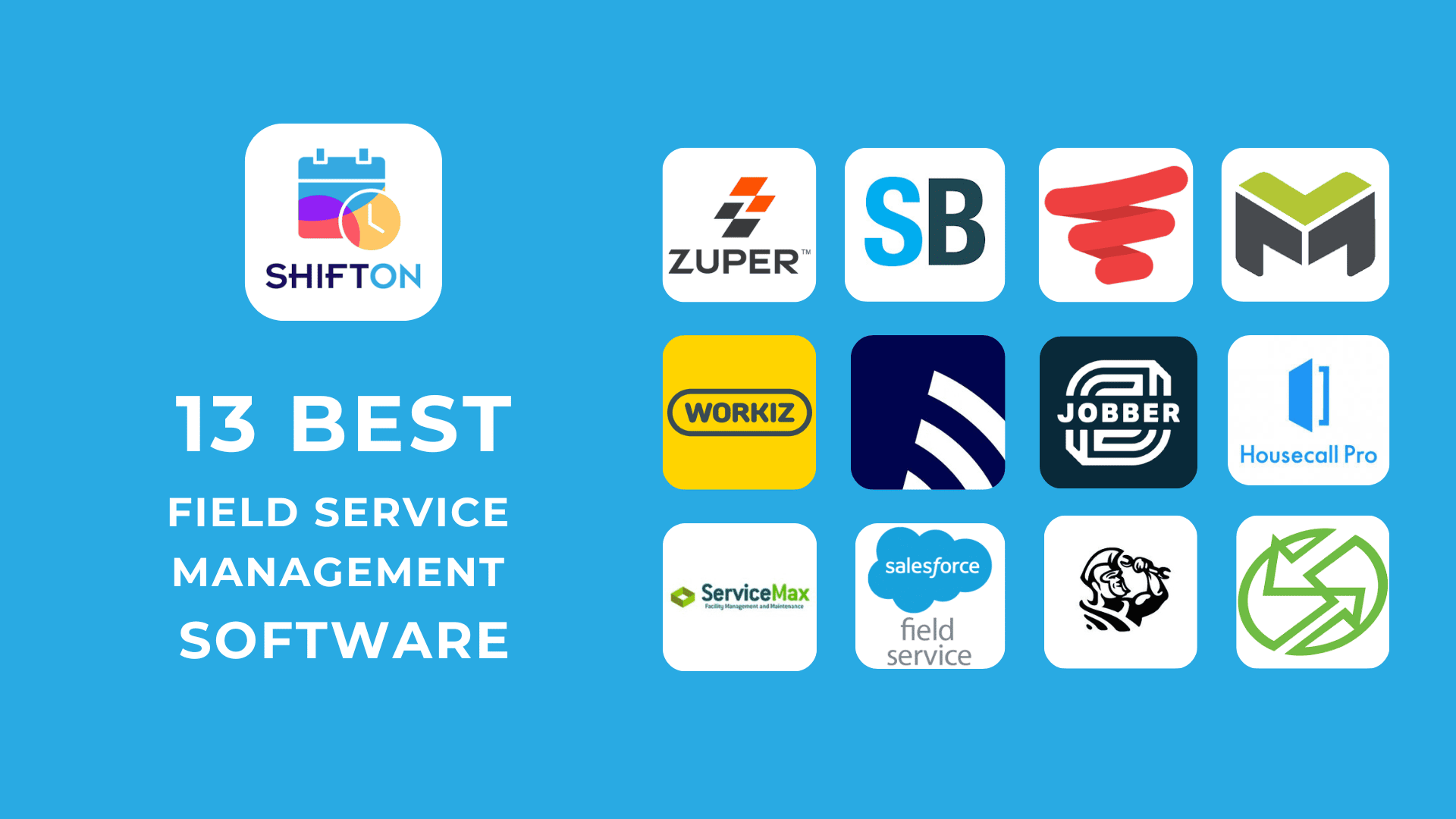In today’s customer-focused business landscape, the best field service management software plays a key role in ensuring a high level of customer satisfaction and optimising work processes. Each year, the number of companies offering on-site services is increasing, making the management of such processes particularly pertinent. In this article, we will examine 13 top software solutions for field service management that will help enhance your business efficiency and maximise the ease of interaction with customers.
Our Top Picks For The Best Field Service Management Software
Shifton Service
A flexible scheduling software for remote businesses.
ServiceTitan
Robust for larger teams, offering end-to-end management.
Jobber
Simpler ideal for smaller teams with streamlined scheduling and invoicing.
What is field service software? The best field service management software comprises specialised systems and tools designed to optimise and automate field-related processes. These solutions are utilised across various industries, including agriculture, construction, top customer field service software, and even emergency services.
One of the principal tasks of leading field service management software is to coordinate activities related to fielding field technicians. This may involve route planning, assigning tasks to employees, and monitoring their progress in real time.
The functions of such programmes often encompass several key aspects:
- Scheduling: Users can create and edit field trip schedules based on job specifics and resource availability. This helps avoid downtime and improves operational efficiency.
- Real-time monitoring: Modern systems allow you to track employees’ locations and the progress of tasks. This can be beneficial for both management and worker safety.
- Inventory and Resource Management: Software can track the availability of necessary materials and equipment, minimising interruptions due to a lack of resources.
- Reporting and Analysis: Systems collect data on tasks performed, time spent, and resources. Analysing this information aids in improving management and identifying process bottlenecks.
- Integration with other systems: Many solutions can integrate with CRM, ERP, and other corporate systems, facilitating more cohesive operation across the company.
Therefore, FSM software is a powerful tool that aids organisations not only in effectively planning and coordinating field trips but also in enhancing the overall quality of customer experience with the best field service management software. In a highly competitive market, the availability of such technologies becomes a crucial factor in the success and sustainable development of a business.
What Are The Benefits Of Field Service Management Software
When choosing the best field service management software, you should consider a few key benefits to maximise its capabilities.
Increased Efficiency
One of the principal advantages of the best field service management software is the increased efficiency of all processes. This is achieved by automating routine tasks such as scheduling appointments, assigning tasks to employees, and tracking fulfilment. The intuitive interfaces and algorithms used in these systems reduce the time spent on administrative tasks, allowing employees to focus on more important aspects of their work.
Enhanced Productivity
In addition to increasing efficiency, implementing the best field service management software leads to increased productivity. Management systems allow for better organisation of workflows, which can significantly reduce the time it takes to complete tasks. For example, such solutions can optimise routes for field service workers, minimising travel time. This not only saves time but also allows you to accomplish more tasks in less time.
Improved Customer Satisfaction
The best field service management software is closely linked to customer satisfaction. By streamlining service delivery processes and improving communication with customers, companies can respond faster and more efficiently. Systems can provide customers with the ability to track the status of a request or order fulfilment, creating transparency and increasing trust in the company.
Optimised Resource Allocation
When selecting a field service solution, it is important to consider its capability to optimise resource allocation. This approach avoids both overutilisation and under-utilisation of equipment and human resources. Platforms can automatically recommend the best options for task allocation based on available resources and employee locations, contributing to more efficient use of funds.
Better Communication And Collaboration
Effective communication between team members is crucial for successful task completion. Modern best field service management software systems include tools for instant messaging, project collaboration, and real-time updates. This creates a unified platform for communication and collaboration, which in turn reduces errors and improves overall service quality.
Enhanced Reporting And Analytics
Finally, leading field service management software offers powerful reporting and analytics tools. These capabilities allow professionals to collect and analyse data on performance, costs, and other critical aspects of the business. Deep analytics help identify bottlenecks in processes, make informed decisions, and find ways to improve, leading field service management software.
Who Needs Field Service Management Tools
Today, the best field service management software tools are becoming key to a multitude of industries that require employees to be dispatched to job sites. This can include maintenance, equipment installation, repairs, and a host of other services. Let’s take a look at exactly who needs these tools and what functions they provide.
The first groups of users of the best field service management software tools are:
- Equipment maintenance companies
- Mechanical and electrical services: needed to schedule maintenance and repairs at customer sites.
- IT service technicians: call upon field service management software features and system troubleshooting.
- Delivery and logistics services
- Courier services: optimise delivery routes and times.
- Transportation companies: control over cargo movement and vehicle condition.
- Real estate service companies
- Property management companies: oversee the work of maintenance personnel, including utilities and cleaning.
- Security services: managing security calls and responding to incidents.
- Agricultural enterprises
- Farms: managing the dispatch of technicians to repair and maintain equipment.
- Agronomists and field technicians: monitoring tasks in the fields.
- Systems integrators and technology companies
- Video and audio installers: scheduling jobs and managing resources for equipment installation.
- IoT-enabled services: managing data and monitoring equipment performance in the field.
Key functions of field service management tools:
- Scheduling
- Automatically create work schedules based on employee availability and call prioritisation.
- Notify customers of assigned services and job times.
- Tools to manage emergency calls and adjustments to scheduled tasks.
- Route optimisation
- Algorithms to calculate the most efficient routes for field staff.
- Consideration of traffic, congestion and other factors to minimise travel time.
- GPS integration for real-time navigation.
- Inventory management
- Control the availability of necessary materials and equipment to provide services.
- Automated tracking of deliveries and stock status in warehouses.
- Demand management and procurement planning.
- Communication and feedback
- Tools for rapid interaction between field staff and the central office.
- Systems to obtain feedback from customers once work is completed.
- Real-time chat and messaging capabilities.
- Reporting and analytics
- Generate reports on completed jobs and evaluate employee performance.
- Analysing customer data and identifying trends in customer relationships.
- Monitoring the fulfilment of KPIs (key performance indicators).
- Mobile solutions
- Mobile applications for accessing information and tasks anytime, anywhere.
- Ability to document work performance and receive reports on a mobile device.
- Synchronisation with cloud systems for data storage.
- Integrations with other systems
- Capabilities to integrate with CRM systems to manage customers and their requests.
- Synchronisation with ERP systems to keep track of finances and resources.
- Integration with customer support systems to handle enquiries and complaints.
The best field service management software tools are essential for a variety of industries, from equipment maintenance to logistics management. These systems help optimise processes, increase customer satisfaction, and reduce costs. Utilising such tools allows companies to remain competitive and efficient in today’s marketplace.
Top Best 13 Field Service Management Software Tools
These tools help in planning, monitoring and managing tasks related to outreach, which in turn improves efficiency and customer satisfaction. But, not every programme can be considered truly effective. What should you look for when choosing the best field service management software? Let’s compare field service management software.
1. What Shifton Looks For In Great Field Service Management Software
Shifton strives to find a programme that not only solves current problems very efficiently, but also has the ability to adapt to growing business requirements. Here are a few key criteria that emphasise what can make software successful:
- User Interface: Ease of use is a critical aspect. Easy navigation and an intuitive interface help to train employees effectively.
- Integration: The ability to integrate with other systems, such as CRM or ERP, makes data and process management much simpler.
- Mobility: Since many employees work out of the office, having a mobile app allows them to access the information they need anytime, anywhere.
- Analytics and reporting: Built-in analytics tools help you track performance, identify bottlenecks, and adjust your strategy.
- Process Automation: The FSM field service management should provide automation of key tasks such as call scheduling and inventory management to reduce errors and save time.
Every business is unique, so software should be flexible and allow you to customise functionality to meet your company’s specific needs.
Features
Effective best field service management software should include a number of specialised features that will help improve overall operational efficiency. Let’s outline some of these:
- Work Order Management: Ensures that tasks are created, assigned and tracked to maximise the efficient use of resources.
- Scheduling and Routing: Simplifies the process of assigning technicians to tasks, optimising travel routes and minimising downtime.
- Inventory Management: Allows you to track the availability of needed materials and ensure their consumption, critical to getting jobs done quickly.
- Mobile access capabilities: Allow technicians in the field to retrieve important information, update task statuses and interact with customers.
- Cost management service FSM tool: Programmes can help manage project budgets and track cash flow in real time.
- Reports and analytics: Provide an opportunity for a company to analyse its performance and make informed decisions based on the data collected.
Thus, strong best field service management software can greatly simplify and improve the customer service process, increasing the overall productivity of the company. Every business should carefully analyse its needs and requirements in order to choose the most appropriate solution that can ensure long-term success.
UI/UX
User interface (UI) and user experience (UX) play a key role in the success of the best field service management software. A well-designed interface makes working with the programme intuitive and user-friendly. Key principles that should be considered in UI/UX design include ease of navigation, visual clarity, and interface adaptability. It is also important to take into account user feedback and suggestions to improve functionality and satisfaction with the application. When optimising UI/UX, programmers should strive to create a system in which each UI element performs its clear function.
Mobile app
With the rapid growth of mobile technology, having a mobile app for the best field service management software is becoming a necessity. Such an app allows employees to access necessary information about customer orders, plan their routes, and share data with the central system anytime and anywhere. The mobile app should support functionality similar to the desktop version, including integration with maps for route optimisation, offline access to key information, and instant notification of schedule changes. Effective utilisation of the mobile app greatly improves the responsiveness to customer enquiries and enhances the overall productivity of the company.
Integration
Integrating your best field service management software with other systems and applications is an important aspect of keeping your business running smoothly. This can include integration with CRM systems, accounting programmes, accounting and resource planning systems. This approach avoids duplication of data, makes it easier to manage processes and reduces the likelihood of errors. In addition, integration with external services, for example, to get up-to-date information on weather or traffic situations, can significantly improve the efficiency of outbound planning.
Cost
The price of the best field service management software varies depending on a variety of factors, such as functionality, number of users, customisability, and level of technical support. Typically, the cost is also affected by the expenses associated with developing and implementing the system, as well as the need for ongoing upgrades and support. Companies can often choose between a subscription-based payment model and a one-time licence purchase, depending on their financial capabilities and long-term goals. The right choice of leading field service management software should take into account not only the current state of affairs, but also the prospects for future business development.
2. ServiceTitan
ServiceTitan is a powerful best field service management software specifically designed for home service companies such as plumbers, electricians, and HVAC. The platform includes tools for scheduling and managing workers, processing requests, invoicing, and job tracking. Key features include a mobile app for technicians, CRM functions, online booking, marketing automation and inventory management. Integration with other systems such as QuickBooks, Mailchimp, and Google Calendar provides a convenient management process. Cost starts at $149 per month.
3. FieldPulse
FieldPulse is a cloud-based management solution for small businesses in field service management software businesses. It offers tools for job scheduling, project management, invoicing, and client communication. Important features include mobile apps, GPS tracker for equipment tracking, CRM features, document automation, and online payments. FieldPulse integrates seamlessly with services such as QuickBooks and Stripe. Pricing starts at $79 per month.
4. Workiz
Workiz is a field work management platform designed for the best field service management software companies, such as cleaning and plumbing services. It offers features for job scheduling, invoicing, customer management, and workflow automation. Unique features include integration with online booking platforms and the ability to track workers in real-time. The platform integrates with Zapier to connect more than 2,000 apps. Cost starts at $49 per month.
5. Housecall Pro
Housecall Pro is a comprehensive field service management solution suitable for a variety of industries. It offers a scheduler, CRM features, billing and online booking tools. Key features include a mobile app for technicians, job management, marketing automation and synchronisation with Google Calendar. Integrations with QuickBooks, Mailchimp, and other services provide additional features. Cost starts at $65 per month.
6. Jobber
Jobber is a cloud-based fieldwork management solution that helps SMBs track jobs, invoice and communicate with clients. Its features include schedule management, workflow automation, CRM functions, and online payment. Jobber integrates with systems like QuickBooks, Xero, and Stripe, making it more functional. Pricing starts at $29 per month, making it affordable for smaller companies.
7. ServiceMax
ServiceMax is a field service management platform geared toward large enterprises. It offers powerful features for job tracking, inventory management, performance analysis, and reporting. ServiceMax integrates with ERP systems and other business applications such as Salesforce and Microsoft Dynamics. Pricing starts at $50 per month, but the exact cost depends on configuration and scope of use.
8. Service Fusion
Service Fusion is a comprehensive FSM service that includes functions for scheduling, customer management and billing. A special feature of the platform is its integration with GPS systems for vehicle tracking. Inventory management and marketing automation are also available. Integration with QuickBooks and other programmes simplifies accounting processes. Cost starts at $65 per month.
9. RazorSync
RazorSync is cloud-based leading field service management software that includes features for invoicing, schedule management, and client communication. The platform offers a mobile app that allows technicians to access jobs and customer information in the field. Integration with QuickBooks and other third-party services provides efficient financial management. Cost starts at $30 per month.
10. ServiceBridge
ServiceBridge is a field service management programme suitable for a variety of businesses, including cleaning and construction. It provides routing, time management, billing, and CRM features. The platform also offers marketing automation and integration with CRM systems. Cost starts at $69 per month.
11. Zuper
Zuper is a field service management software SaaS platform that includes scheduling, task management, and results tracking features. It is suitable for small to medium-sized businesses and offers a mobile app for easy on-site task completion. Integration with other programmes such as QuickBooks provides ease of financial management. Pricing for Zuper starts at $45 per month.
12. mHelpDesk
mHelpDesk is a cloud-based field service management solution that offers tools for project management, invoicing, client management, and other business processes. Features include document automation and integration with various financial programmes such as QuickBooks. Cost starts at $49 per month.
13. Salesforce Field Service
Salesforce Field Service is an extension for the Salesforce platform that provides field service management for large organisations. It offers powerful features for process automation, inventory management, and customer interaction. In addition, users can take advantage of analytics and reporting tools. Salesforce supports integration with multiple third-party applications and platforms. Cost varies by configuration, starting at £150 per month per user.
How To Choose the Best Field Service Software
Choosing the right field service management software can have a significant impact on business efficiency. This solution should meet the specific needs of your company and provide an opportunity to optimise processes. Let’s take a look at a few key aspects to consider when choosing the right platform.
Essential Features
When choosing a leading field service management software, it is important to pay attention to its main features. Such features include:
- Scheduling and job field services management: The platform should allow you to easily assign jobs, manage schedules, and change them as needed. The ideal fsm software provides a clear interface to view employee workload.
- Billing and Payments: Easy invoicing and the ability to accept payments online will greatly simplify your company’s financial processes.
- Customer Relationship Management (CRM): CRM features allow you to track customer interactions, order histories and preferences, which will be helpful when working on repeat orders.
- Mobile App: Having a mobile app for field technicians provides quick access to the information they need and the ability to update job statuses in real time.
All these things to consider.
Types of Field Service Software
There are different types of software to consider:
- Total Field Service Management: These solutions cover all aspects of the business, from job scheduling to invoicing. It can be a cloud-based solution or an on-premises solution.
- Specialised tools: Sometimes you need a simple tool that solves specific tasks, such as an invoicing-only or project management application.
- Integrated systems: These are platforms that offer multiple functions in one solution, including CRM, invoicing, and inventory management, avoiding the confusion of using multiple programmes.
These are the main ones of the types in use now.
Ease of Use
An important aspect of leading field service management software selection is its usability. The platform should be intuitive so that employees can quickly become acclimatised to it without the need for lengthy training. Consider testing the software before purchasing to ensure that the interface and functionality meet your team’s needs.
Customer Support
Reliable customer support is one of the most important features to consider. Choosing a provider with high-quality support will ensure that you can get help when you have problems or questions. Find out if various support channels such as phone, chat, and email are available, and if there is an extensive knowledge base and training materials.
Integrations
Many successful business processes depend on integrating different platforms. Make sure the software you choose can easily integrate with other systems you already use, such as accounting programmes, CRM systems, or inventory management platforms. Having integrations in place will help you avoid data imbalances and reduce the chance of errors.
Methodology
In today’s business environment, project and best field service management software methodology plays a key role in achieving success. In this article, we look at key aspects regarding pricing, functionality of mobile solutions, system features, and level of technical support.
Pricing and fees
Pricing and fees in the service delivery industry can vary depending on a variety of factors. Most often, the cost depends on the complexity of the offerings, the level of service provided, and the market in which you operate. The main approaches to pricing include flat rates, hourly rates, and outcome-based models. It is important to not only set competitive pricing, but also to provide a clear and transparent fee structure for clients.
General Features
The overall characteristics of the software for field service management or service should include a number of key features. Being in a competitive market, aspects such as user interface, ease of customisation and integration with other systems should be considered. Good leading field service management software should be feature-rich, allowing users the flexibility to customise to their needs, as well as providing a high level of data security.
Mobile Functionality
With the increasing reliance on mobile devices, having mobile functionality is becoming a must. The ability to access key leading field service management software features through mobile apps allows users to manage tasks on the go, receive notifications, and quickly correct errors. This is especially important for field workers who need to stay connected and have access to the information they need in any situation.
Service and Support
Quality customer service and support is critical to the success of any methodology. Reliable technical support should be available around the clock and should include resources such as tutorials, a user forum, and feedback options. This helps users resolve issues quickly and utilise the software effectively.
Expert Score
Expert evaluation is an important step to verify the reliability and functionality of the proposed solutions. Objective analysis using performance metrics, customer feedback, and expert field service management software reviews will help identify the strengths and weaknesses of the software. Publications and field service management software ratings in professional publications can also serve as an authoritative source of information and recommendations, making it easier to choose the right solution!





